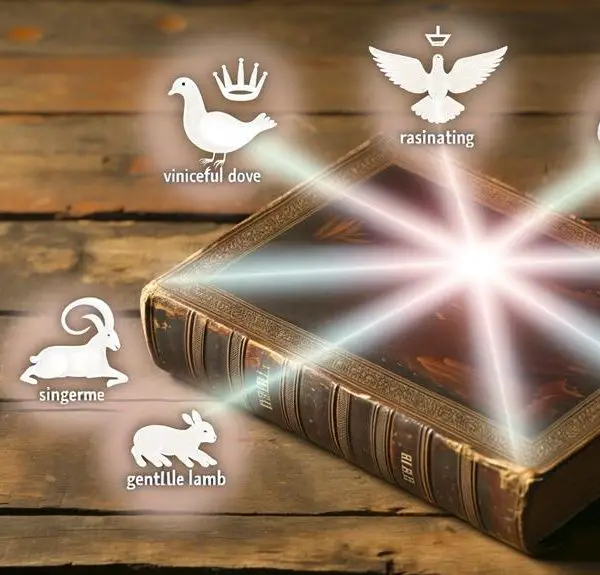Biblical 'woe' reveals profound despair and divine warnings, beckoning a deeper exploration of its implications and lessons.

Define Woe in the Bible
In the Bible, "woe" is a term you'll find deeply entwined with expressions of grief and dire warnings of judgment. It originates from the Hebrew word 'hoy', signaling lamentation or misery, often in response to sin or moral failure. This concept evolves through scriptural narrative, serving as a prophetic tool to announce misfortune and provoke ethical reflection. Especially in Jesus' teachings, "woe" underscores warnings against hypocrisy and injustice, aligning with divine judgment themes. It's not just a simple exclamation; it's a multifaceted signal urging a transformation of moral compasses. Understanding its layered meanings might open new dimensions in scripture for you.
Key Takeaways
- 'Woe' in the Bible originates from the Hebrew word 'hoy,' signifying lamentation and grief.
- It serves as a prophetic warning of misfortune and judgment.
- Used to express profound sorrow and to evoke a response for moral reflection and change.
- In the teachings of Jesus, 'woe' is a stern rebuke against hypocrisy and injustice.
- In apocalyptic literature, 'woe' heralds severe divine judgments and catastrophic events.
Origins of 'Woe' in Scripture

The term 'woe' in the Bible originates from the Hebrew word 'hoy,' an exclamation of lamentation and grief. This linguistic root is crucial in understanding the emotional and cultural depth conveyed when 'woe' is used in scriptural texts. You'll notice that its primary function is to express sorrow or denunciation, which is a common thematic element throughout the biblical narratives.
As you explore further into the woe etymology, you'll see that its usage extends beyond mere expression of distress. The term has undergone significant linguistic evolution over centuries. Originally, 'hoy' served not only as an outcry of pain but also as a warning or prophetic announcement of misfortune, which often carried moral implications. This evolution reflects changes in language and society, where words adapt in meaning and connotation to suit the contexts of their times.
In analyzing the linguistic journey of 'woe,' it's clear that its application in the Bible is both a reflection of societal norms and a tool for religious and ethical instruction. The term's adaptability in various contexts over time highlights its enduring relevance and impact in biblical literature, which you'll find enriches your understanding of scriptural messages.
'Woe' in Prophetic Literature
In your exploration of 'Woe' within prophetic literature, you'll encounter its profound implications and varied usages. As you examine specific examples from biblical prophecy, notice how these instances shape the overall message conveyed to the audience. Consider also the impact these declarations of woe had on contemporary and subsequent listeners, influencing perceptions and actions in significant ways.
Meaning of 'Woe'
Woe's usage in prophetic literature typically signifies a dire warning or judgment upon individuals or nations. Tracing the etymology of 'woe,' you'll find it rooted in Old English *wā*, denoting profound sorrow or misery. This historical context enriches its emotional connotations, particularly in biblical texts, where it often underscores the severe consequences of moral failures or social injustices. As you explore further, you'll see that 'woe' isn't merely an expression of grief but a pivotal tool for prophets. It serves to evoke a visceral response from the audience, ensuring that the warnings are not only heard but felt, compelling a reflection or change. This multidimensional usage highlights its importance in conveying divine discontent and urging repentance.
Examples in Prophecy
Exploring prophetic literature reveals numerous instances where 'woe' serves as a stark admonition against societal and moral decay. Woe's frequency in these texts is not just a stylistic choice; it's a deliberate tool used by prophets to underscore the urgency and gravity of their messages. This term punctuates prophetic warnings and judgments, highlighting the severe consequences of continued moral failings.
The emotional resonance of 'woe' in these contexts cannot be overstated. It conveys a profound sense of impending doom and sorrow, aiming to stir the conscience of the audience. This resonance amplifies the prophetic message, reinforcing the dire need for societal change and moral rehabilitation before it's too late. Therefore, 'woe' functions as both a warning and a call to action.
Impact on Audiences
When prophets declared 'woe' in biblical texts, their audiences were often compelled to reflect deeply on their own ethical and moral standings. The emotional resonance of these declarations varied across different groups, reflecting the audience diversity of the times. As you explore this phenomenon, consider how the societal and cultural contexts shaped the reception and interpretation of these prophetic messages.
Emotional Impact |
Audience Group |
Cultural Context |
|---|---|---|
Deep reflection |
Common folk |
Rural |
Fear and anticipation |
Religious leaders |
Urban settings |
Moral reevaluation |
Rulers and elites |
Courtly |
Social responsibility |
General populace |
Mixed communities |
Each response highlights the nuanced way 'woe' functioned as a tool for moral and social critique in ancient societies.
Jesus and the Use of 'Woe'
As you explore the New Covenant, you'll find that Jesus employs 'woe' not merely as a lament but as a stern warning, often to underscore the gravity of hypocritical behavior and injustice. His use of 'woe' serves to reveal deeper prophetic implications, aligning his messages with themes of accountability and divine judgment seen in earlier scriptures. This strategic usage underscores the continuity of prophetic tradition, emphasizing a call to ethical integrity and spiritual vigilance.
Jesus' Warnings Expressed
How did Jesus employ the term 'woe' to communicate profound warnings and admonitions in his teachings? In the biblical context, 'woe' serves as a stark exclamation, often prefacing significant ethical teachings. Jesus used 'woe' to underscore the gravity of his messages, particularly in addressing hypocrisy and injustice. His employment of 'woe' during sermons amplified the impact of his words, compelling his audience to reflect deeply on their actions and moral standings. This rhetorical strategy not only heightened the sermon's impact but also reinforced the seriousness of living in alignment with ethical principles. Jesus's consistent use of 'woe' exemplifies his dedication to guiding followers towards righteousness, marking a pivotal aspect of his instructional method.
Prophetic Implications Unveiled
Jesus's exploration of 'woe' not only conveyed warning but also bore deep prophetic implications, revealing forthcoming judgments and divine expectations. When you investigate further, you'll notice that his pronouncements often linked to divine retribution and an eschatological forecast. These woes weren't merely rhetorical devices; they were a profound encapsulation of future realities rooted in moral and spiritual truths. They served as a divine mechanism to underscore the seriousness of straying from God's path and highlighted the inevitable consequences of such actions. Through these warnings, Jesus effectively mapped out a trajectory of divine judgment that was both imminent and far-reaching, urging his hearers to align their lives with God's commandments to avoid such dire outcomes.
Theological Implications of 'Woe'

In exploring the theological implications of 'woe,' it is vital to understand its role as a profound expression of divine judgment and warning in biblical texts. These declarations serve not only as premonitions but also underscore the ethical consequences of the behaviors being judged. As you investigate further, you'll see that 'woe' functions as a pivotal tool through which the divine communicates dissatisfaction with moral transgressions and social injustices.
This expression is particularly significant because it articulates a direct link between divine judgment and the ethical framework within which humanity is expected to operate. It's not just about punishment; it's also about correction and guiding societies back to righteous paths that align with divine expectations. Each instance of 'woe' in the scriptures acts as a mirror reflecting the specific ethical failings of individuals or communities, and at the same time, it outlines the potential for redemption through repentance and reform.
Therefore, understanding 'woe' deepens your grasp of the complex relationship between divine intention, human action, and the potential for spiritual and societal renewal. It highlights that divine judgment is intricately connected to ethical living, making it an important concept for both theological reflection and practical application in everyday life.
'Woe' in Apocalyptic Contexts
Amid the vivid imagery of apocalyptic literature, 'woe' often heralds catastrophic events and divine judgments that underscore the consequences of humanity's moral failings. This term surfaces prominently in texts dealing with eschatological themes, where it serves as a sobering reminder of the impending doom awaiting those who stray from divine mandates.
In the Book of Revelation, 'woe' is intricately linked with the unfolding of end-time signals. The text uses 'woe' to punctuate the severity of the plagues and horrors that are to be released upon the earth, marking distinct phases in the divine plan of judgment and redemption. Revelation analysis reveals that each proclamation of 'woe' corresponds with escalating judgments, emphasizing a pattern of increasing intensity and seriousness as the narrative progresses towards the climax of the apocalyptic vision.
To understand 'woe' within these contexts, consider the following aspects:
- Prophetic Function: 'Woe' acts as a warning, alerting humanity to the critical nature of the times and urging repentance.
- Literary Device: It enhances the dramatic impact of the narrative, deepening the sense of urgency and peril.
- Theological Significance: 'Woe' underscores a divine response to human sinfulness, highlighting the justice aspect of God's character in apocalyptic scenarios.
Analyzing 'woe' in these terms offers deeper insights into its role and significance in biblical eschatology, particularly within the stark and stirring frameworks of apocalyptic literature.
Modern Interpretations of 'Woe

Modern interpretations of 'woe' reveal its evolution from a biblical warning to a nuanced symbol in contemporary theological discourse. As you explore further into this transformation, it's crucial to understand how cultural shifts and linguistic evolution have reshaped the meaning and use of 'woe' in modern contexts.
The table below highlights key aspects of this evolution:
Aspect |
Description |
|---|---|
Cultural Shifts |
The term has adapted to reflect societal changes, including secularization and the diversification of moral landscapes. |
Linguistic Evolution |
'Woe' has evolved from a strictly religious connotation to a broader, often metaphorical usage in everyday language. |
Theological Reinterpretation |
Theologians now often interpret 'woe' as a complex symbol of both judgment and a call to awareness, rather than simple condemnation. |
Literary Usage |
In literature, 'woe' is used to explore themes of despair and warning, enriching its interpretative layers. |
Public Discourse |
In media and public speeches, 'woe' evokes a sense of urgency or profound concern, appealing to collective conscience. |
This nuanced understanding allows you to appreciate how 'woe' serves not just as a relic of ancient script but as a living, adaptive element of language that continues to influence both spiritual and secular domains.
Frequently Asked Questions
How Do Different Bible Translations Handle the Term "Woe"?
Different Bible translations vary in handling "woe," focusing on translation consistency and linguistic roots. You'll find nuanced interpretations that aim to maintain the original term's depth while adapting to modern language understanding.
Are There Any Positive Uses of "Woe" in the Bible?
In the Bible, 'woe' typically connotes misery or judgment, yet there are instances where woe blessings emerge as prophetic paradoxes, revealing deeper, transformative meanings that aren't immediately apparent on the surface.
How Has the Interpretation of "Woe" Evolved Over Time?
You'll find that "woe" has evolved through linguistic shifts and changing cultural perceptions, transforming its biblical severity into more varied, sometimes secular interpretations in contemporary language and understanding.
What Impact Does the Use of "Woe" Have on Modern Readers?
Fascinatingly, when you read 'woe' in texts, it resonates emotionally, highlighting its contemporary relevance. This usage often impacts you by deepening your understanding of despair and urgency in a scholarly and objective manner.
How Do Non-Christian Cultures Interpret Biblical "Woes"?
You'll find that non-Christian cultures interpret biblical "woes" through diverse lenses, leading to varied interpretive variations. Cultural comparisons show differing receptions and adaptations of these warnings or expressions of lament.



Sign up